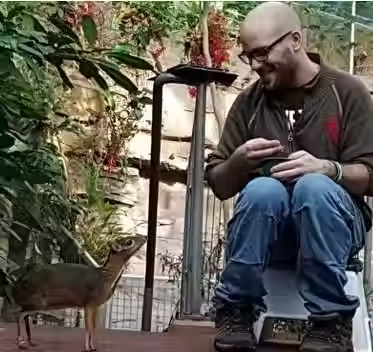How Zoo Keepers Made me a Better Professional: A Researcher's Perspective
- Oct 4, 2019
- 4 min read
Updated: Jul 29, 2025
Today is International Zoo Keeper Day, which was created in 2015 by the International Congress of Zoo Keepers to celebrate the fantastic work done by zoo keepers worldwide.
Many people still think of zoo keepers as solely "poop shovelers". whose job functions don't extend much beyond cleaning and feeding the animals under their care. This is of course not the case. I am sure no zoo keeper will deny those are a significant part of their job routines, but there is so much more - zoo keepers are animal carers, veterinary assistants, conservation and science aides, education providers, mentors and teachers!
In the theme of the day, it is only appropriate to highlight how zoo keepers helped me growing personally and professionally, and how they are vital agents in zoo science.
Zoo keepers as teachers & mentors.

Even though my main career ambition has been, since I can remember, to work more directly in zoo research and conservation, zoo keeping was my first door into the zoo world. I started my career as a volunteer keeper at Lisbon Zoo, when I was only 16 years old, and that experience had a powerful impact on my life. Not only it further inspired me to pursue the career I wanted, but it also gave me the first hands-on knowledge of working in a zoo and what it means.
Zoo keepers were in fact my first "zoo teachers" and they taught me some important information on working with animals, including animal behaviour and welfare, environmental enrichment, training, breeding programmes and records. They also showed me how to engage with the visitors to better raise awareness and share important conservation messages. What I learned in these three years was the foundation of my current knowledge of zoo animals, which I have since then been building on.
I temporarily went back to zoo keeping later on, after some years away in university and research-focused positions. This experience was again very enriching, as it allowed me to develop skills in husbandry and management of various taxa, and to further develop communication skills with different professionals within a zoo, a very important skill for any zoo researcher. During that time as a keeper, I worked alongside dedicated professionals and helped creating and providing enrichment to the animals (putting some of the science I have been reading in practice!), assisted the veterinarians with health procedures, gave educational talks and presentations to the public and helped ensuring the animals under our care had the best possible quality of life.
It was definitely a good reminder of how knowledgeable, skilled and versatile zoo keepers have to be in order to do all the different tasks their job requires, the emotional challenges of looking after the animals under their care, whose welfare directly depends on them, and the toughness they must have to endure the hard work and, very often, the nasty weather outside. Warriors, indeed!
Aiding science and supporting researchers.
On top of all the above mentioned, zoo keepers have also been vital collaborators in all zoo research projects I have conducted or been involved in. Here are some examples...

I conducted a multi-zoo research project on mouse deer behaviour and husbandry, in 2016/2017, as part of my postgraduate studies, and when I started, I had little information available to work with, especially on their behaviour. It was the extensive knowledge of zoo keepers that have been working with these animals for many years (special shout out to the keepers at ARTIS Amsterdam Zoo!) that helped me designing an appropriate methodology for the study and to build a comprehensive list of behaviours (ethogram) for the species. Keepers from all the various European zoos I visited also supported me throughout the entire study, answering questions, sharing information about each mouse deer at their zoo and facilitating all the logistics for the data collection. On a less scientific note, I am also grateful to the fine keepers at Copenhagen Zoo for letting me watch and partake in a training session with their mouse deer, and take the photo that has become my absolutely favourite animal photo in my career (you may have seen it before as I don't shy away from sharing it!).
Similarly, my current research project on captive parrot behavioural ecology is also directly dependent on the collaboration of zoo keepers... From help in the planning process to individual identification and enclosure modifications, which I will eventually need done in order to do my research, I literally cannot conduct this study without the help of the keepers in the zoos I am collaborating with.
I have no doubts my fellow zoo researchers, seniors or juniors, will agree with me on this one: the success of most, if not all, zoo research projects, or of zoo science in general, depends to some extent on the work of these incredible professionals!
Summing it up...
Thank you to all zoo keepers worldwide for their outstanding commitment to animal welfare, wildlife conservation, scientific research and education! More personally, thank you to all zoo keepers that I have worked or collaborated with for teaching me, guiding me, helping me, inspiring me and for making me a better zoo scientist!





























Comments